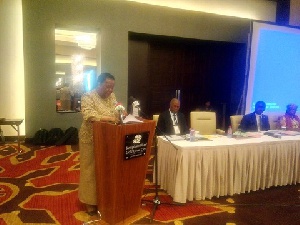 Ghana is the first partner country of VLBI Network to have a functioning radio telescope
Ghana is the first partner country of VLBI Network to have a functioning radio telescope
The launch of Ghana’s first Radio Astronomy Observatory on Thursday was preceded with the Fourth Ministerial Conference involving the nine partner African countries that are institutionalising a cooperation in radio astronomy in Africa.
The conference, hosted by the Ministry of Environment, Science, Technology and Innovation (MESTI), served as a platform for partners of the African Square Kilometre Array (SKA) Consortium preparing for the eventual implementation of Phase two of the global SKA project in their countries to meet to establish a joint cooperation.
Ghana is the first partner country of the African Very Long Baseline Interferometry (VLBI) Network (AVN) to complete the conversion of a communications antenna into a functioning radio telescope.
The 32-metre converted telecommunications antenna at the Intelsat Satellite Earth Station at Kuntunse would be integrated into the AVN in preparation for the second phase construction of the SKA across the African Continent.
The meeting, was therefore, to review progress against three joint flagship projects namely; the African SKA, the African VLBI Network, and the Big Data Africa initiative, through which the African SKA was preparing itself for the implementation of SKA Phase Two.
The launch of the observatory, also known as radio telescope makes Ghana the second African country to own a radio telescope, which allows radio astronomy to achieve high angular resolutions.
Ghana, South Africa, Namibia, Kenya, Mozambique, Madagascar, Botswana, Mauritius, and Zambia are the African partner countries contributing to the SKA network.
Representatives and Ministers from the participating countries committed themselves to the signing of a Memorandum of Understanding (MoU) that mandated the countries to put in place all the necessary measures for the successful construction and operation of the SKA and AVN telescopes in their respective countries.
The MoU also mandated the countries to establish and sign, by June 2018, a binding international agreement on cooperation in support of the implementation of the African components of the global SKA project.
Professor Kwabena Frimpong-Boateng, the Minister of Environment, Science, Technology and Innovation, said the SKA project was a big opportunity for Ghana and South Africa to work more closely together.
“We in Ghana should be careful not to regard this cooperation as a one way affair. We should develop our local absorptive capacity to assimilate the skills and technologies that we are acquiring,” he noted.
He, therefore, charged all and sundry to be part of the process in developing the country by building capacity to absorb, apply, maintain and replicate technologies needed to put Ghana on a higher pedestal globally.
The Minister said: “We have to step up efforts to develop the capacity to manufacture spare parts, machine parts and components and eventually build, install and maintain simple technologies needed in areas such as agriculture.”
He said the local participation content should not just refer to local cheap labour and lower level skill activities but rather it must involve high-tech and high-end managerial skills.
Ms Naledi Pandor, the South African Minister of Science and Technology, said globally, research infrastructure projects played an invaluable role in focusing the attention of policy and decision-makers and the public on science and technology.
She said the contribution that SKA promises to make to the understanding of the universe was vast and so the radio telescope project in Ghana would reveal the future of astronomy over the next decade.
“It's an IT project of the kind that pushes the boundaries of global technology.
Big tech companies like IBM and Cisco are already involved, because they know it will allow them to develop the knowledge and technologies that will keep them at the leading edge of computing.
“This in turn will benefit computer users in many spheres from finance to government through industry and medicine to other science researchers” Ms Pandor noted.
She announced that funds were accessed from the African Rennaissance Fund to support the Kuntunse Radio Observatory Project.
The SKA is an international effort to build world’s largest radio telescope, which would require data processing facilities and capabilities that was currently available, producing data volumes in excess of current global internet traffic among other things.
Radio astronomy includes all of the science, technology, engineering and mathematics skills that underpin the emergence of a strong developed economy.